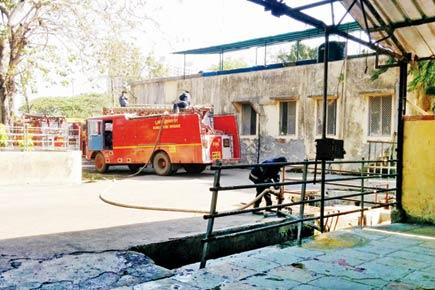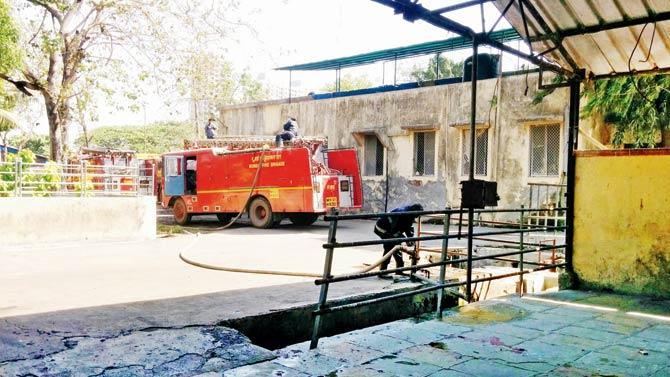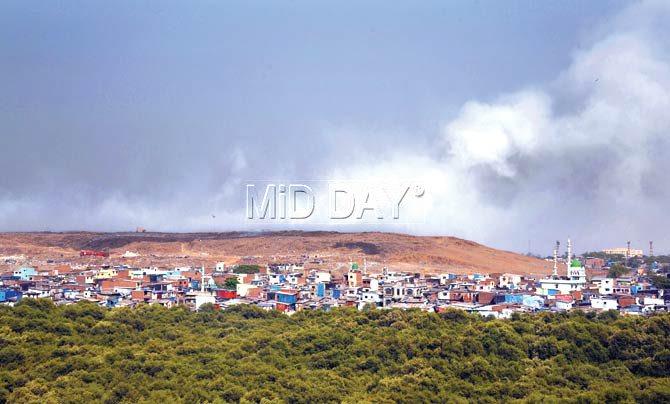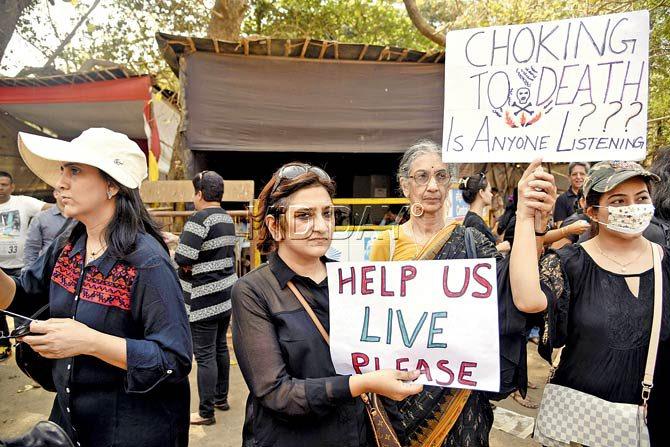Even as Mumbai, Thane and Kalyan reel under acute water shortage, 98 tankers were used in just a single day of firefighting at the Deonar dumping ground

Even if the authorities finally manage to control the blaze at the Deonar dumping ground, Mumbai could remain scorched for months by acute water crisis — each day that the fire rages on, the authorities are burning through more than a million litres of drinking water in their efforts to quench the flames.
ADVERTISEMENT
Also Read: Toxic fumes at Deonar abattoir get suppliers' goat

Fire brigade tankers fill water from the Deonar abattoir. The BMC ward officer confirmed that most of the 98 tankers of water had been sourced from there
This comes at a time when the city is already facing water cuts ranging from 15-20%. Thane and Kalyan have it even worse, with zero water supply for as many as two to three days a week. In other districts like Latur, it has become common for fights to break out over water. But the BMC has no choice but to use its dwindling stock of potable water from the Deonar abattoir and water tankers for firefighting efforts.

For the second time in as many months, the mountains of trash at the Deonar dumping ground are ablaze, with the authorities having failed to take any lessons from the January incident. Pic/Sameer Markande
Kiran Dighavkar, ward officer of M/east ward, confirmed that nearly 98 tankers of water had been used in just a single day, and most of them had come from Deonar abattoir. “Most of the water came in from Deonar abattoir and some from RCF. Today we have set up tanks at the Deonar dumping ground itself, with a capacity of nearly 30,000 litres. I will have to check how many trips the tankers have made in total,” said Dighavkar.
Read Story: Deonar fire: Smoke drives locals out of their homes

Fed up of the repeated fires and the unscientific waste management at the Deonar dumping ground, citizens are now calling for it to be shut down completely. Pic/Atul Kamble
When this reporter visited Deonar abattoir, water tankers were being filled with potable drinking water. Yogesh Shetye, the general manager at the abattoir confirmed this. He said, “We are providing tankers with water that is potable; we use the same in our abattoir too.” The capacity of each tanker varies between 10,000 to 12,000 litres. Counting an average of 11,000 litres per tanker, the BMC has spent 10.78 lakh litres on just one day of firefighting at Deonar, and this doesn’t even include the 30,000 litres stored at the dumping ground itself.
The local corporator has laid the blame for this squarely on the corporation, for its failure to act quickly after a similar blaze at the dump yard less than two months ago. “BMC has become a sleeping giant. After the first fire in January, we were shouting that they should take preventive measures so that the incident isn’t repeated again. However, the civic body never took any of these steps, thus wasting so much water to douse the fire,” said Deonar corporator Rais Shaikh, who is also the Samajwadi Party group leader in the BMC. He added that if the BMC had utilised measures like slope stabilisation and covered the garbage with debris, the second fire could have been prevented. The party even carried out a protest on Tuesday outside the dumping ground, preventing dumpers from entering the premises.
Shiv Sena’s Trushna Vishwasrao, leader of the house in the BMC, said, “We already are facing water cuts in the city and we still have May and April ahead of us. Despite that we are wasting so much water. Why aren’t we using water from Vashi creek instead? If there is some hurdle in using it, the commissioner should sort it out. We cannot afford to waste water any more.”
 Subscribe today by clicking the link and stay updated with the latest news!" Click here!
Subscribe today by clicking the link and stay updated with the latest news!" Click here!






